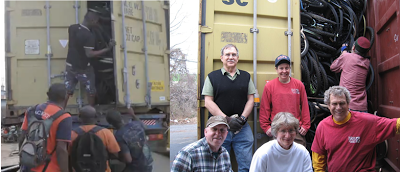Earlier this spring BfW bikes donated last year to Ghana were loaded onto smaller trucks and transported to rural areas of the country. The bikes were introduced to their new owners through VBP's Preventative Maintenance Workshop.
When container shipments of bikes come into Ghana they are offloaded and stored at VBP's main warehouse in Accra. They are then loaded onto smaller trucks and transported many hours to remote villages all around Ghana.
This particular shipment included 80 bikes donated by BfW. The bikes were transported to two different communities, one in Lawra and the other Kalsagri.
After a two day journey, the bikes arrived on site where three staff members and six trainers were ready to teach the workshop to eager villagers ranging in age from 13 to over 60. Each participant was chosen by community leaders. and represented workers, farmers, and students.
The mechanics would take a day to ready the bikes for the class. Participants in the workshop would be learning basic maintenance and care, like how to keep the chain free of grit and how to repair a flat tire.
 |
| Simon is a local mechanic |
One last detail of the class needed to be worked out before beginning. For each workshop offered throughout Ghana, VBP identifies and recruits local mechanics to assist at the workshop. This helps establish a relationship between the new bike owner and their local mechanic who will help them going forward with spare parts and more complicated repairs.
This spring, they brought on two local mechanics to help with training. For their support VBP rewards each mechanic with a specialized tool set. Participants in the class would be going home with a bike. Each participant pays less than $25 for the workshop and bike.
 From VBP: "This donation was very helpful to meet the critical needs of some people in Ghana's rural north. It was especially important for school children who have had to walk over eight miles to and from school every day."
From VBP: "This donation was very helpful to meet the critical needs of some people in Ghana's rural north. It was especially important for school children who have had to walk over eight miles to and from school every day."They also report that the task of monitoring and evaluating the beneficiaries is a priority for VBP staff. They will continue to check in on, especially the students, to see how the bikes are affecting their studies.
The breakdown of BfW specific beneficiaries in these two villages are as follows:
42 students
15 small scale entrepreneurs
22 farmers
1 teacher












































